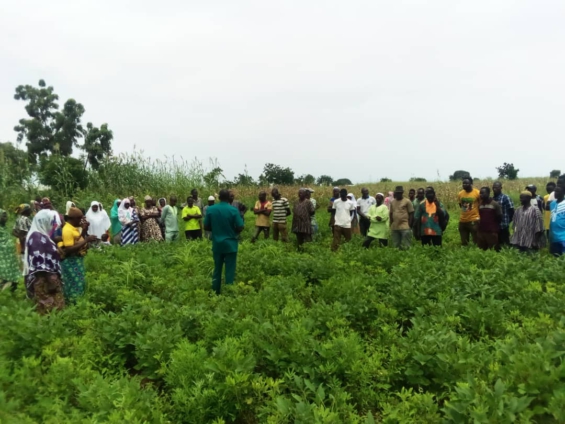The Savanah Agriculture Research Institute of the Council for Scientific Industrial Research (CSRI-SARI), has introduced high yielding groundnut varieties to farmers in the Pusiga District of the Upper East Region.
The groundnut varieties, SARINUT 1 and SARINUT 2, developed by CSIR-SARI and its partners were released in 2019.
“These varieties are high yielding and tolerant to early and late leaf spot diseases, important diseases of groundnut that can cause up to 90% yield loss in some places. SARINUT 2 is particularly recommended for the Upper East Region because it matures within 90 days after sowing”.
A crop breeder at the CSIR-SARI, Dr Richard Oteng-Frimpong, said this when he inspected some of the groundnut farms at Boabula in the Pusiga District.
He said the new varieties would mitigate losses caused by evolving climate patterns, pests, and disease complexes.
“These varieties are being delivered through building partnerships and linkages among stakeholders and a robust framework to facilitate smallholder farmers’ access to high-quality seeds with a high commitment to gender equity as a guiding principle”, he added.
The crop breeder explained that the project went into partnership with farmers who expressed an interest in the new varieties, to help them multiply the seeds at the local level, to make the seeds of the new varieties readily available to farmers within their communities.
He said the average groundnut yield on farmers’ fields in the Upper East Region was below 0.5 tonnes per hectare which was far below the national average of about 1.3 tonnes per hectare.
He attributed the poor harvest to the use of low yielding varieties which were usually susceptible to groundnut diseases.
According to Dr Oteng-Frimpong, CSIR-SARI was implementing the Accelerated Varietal Improvement and Seed Delivery of Legumes and Cereals in Africa (AVISA) project with its partners, to adopt modern best practices to deliver a continuous stream of improved groundnut varieties for smallholders to achieve improved nutrition, greater yields, higher incomes and improved livelihoods.
He said the visit to the farms followed a training of trainers’ workshop on groundnut seed production organized by CSIR-SARI for Agricultural Extension Agents, field technicians of NGOs, Seed companies, and leaders of some FBOs in March 2020.
Research Scientist Dr Doris K. Puozaa, who has been working on Seed Science and Systems Development at CSIR-SARI, said the approach was expected to contribute to the vision of the institute of getting seeds of new improved varieties to farmers and also support the government’s efforts to increase crop production through programmes like the Planting for Food and Jobs (PFJ).
The Pusiga District Director of the Department of Agriculture, Mr Mohamudu Iddi who supervised the field day, commended the community groundnut seed growers for the good work done and urged other farmers to adopt the new technologies being introduced to them to increase groundnut production, which he said was on the decline in the district.
He thanked Dr Francis Kusi, the Upper East Regional Coordinator of the two projects for extending the project’s activities to farmers in Pusiga District.
Latest Stories
-
Full list of Awardees at the 9th Edition of the Annual CEO Summit
6 minutes -
Freedom at last: Court of appeal acquits Ataa Ayi’s alleged accomplice after 23 years in prison
22 minutes -
Ishamael Yamson urges President Mahama to ring-fence fuel levy proceeds as promised
26 minutes -
Ken Ofori-Atta is not avoiding OSP – Alhassan Tampuli
34 minutes -
Consider virtual interrogation of Ken Ofori-Atta – Alhassan Tampuli tells OSP
37 minutes -
OSP vs Ken Ofori-Atta: I also faced interrogations – Seth Terkper
43 minutes -
36 years in prison for a mistake at 17 – The forgotten life of a once-promising goalkeeper Akwasi Alhassan
1 hour -
Energy Sector Levy necessary measure to restore power sector stability – Independent Power Generators
2 hours -
Oaks FC to augment squad ahead of maiden WPL season
2 hours -
Strategic Partnerships: Unlocking growth beyond internal capacity
3 hours -
Nigerian boxer’s death: GBA spokesperson questions probe committee’s motives
3 hours -
Doctors at Ridge Hospital ‘are overburdened’ as nurses strike bites – Medical Director
3 hours -
You’ll pay ‘Dumsor Levy’ even when you are walking – Alhassan Tampuli asserts
3 hours -
Prof. Bokpin believes stabilizing the cedi at GH₵10–12 is the right approach
3 hours -
‘Ghana sprinting has reached crescendo of the world’ – Fuseini hails Saminu’s 100m world-leading run
3 hours

